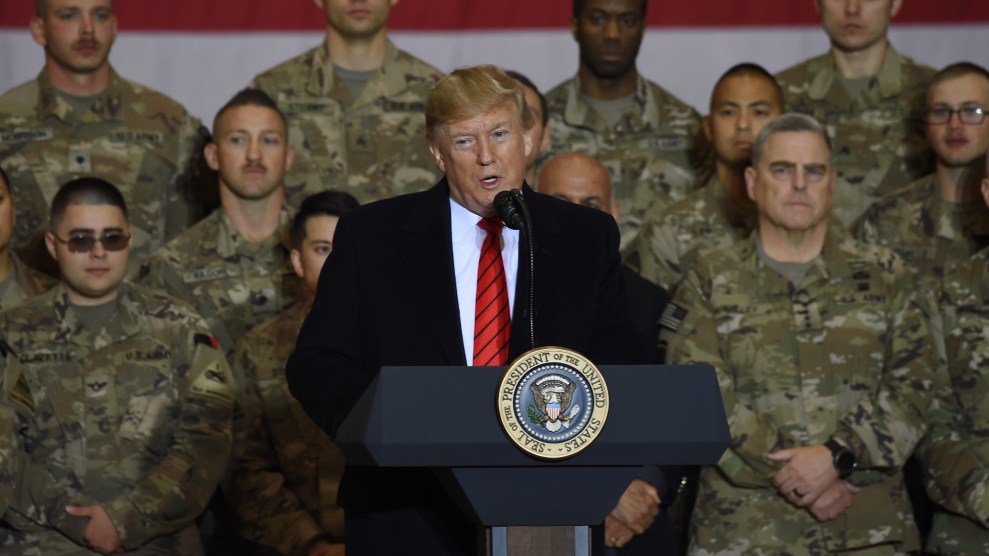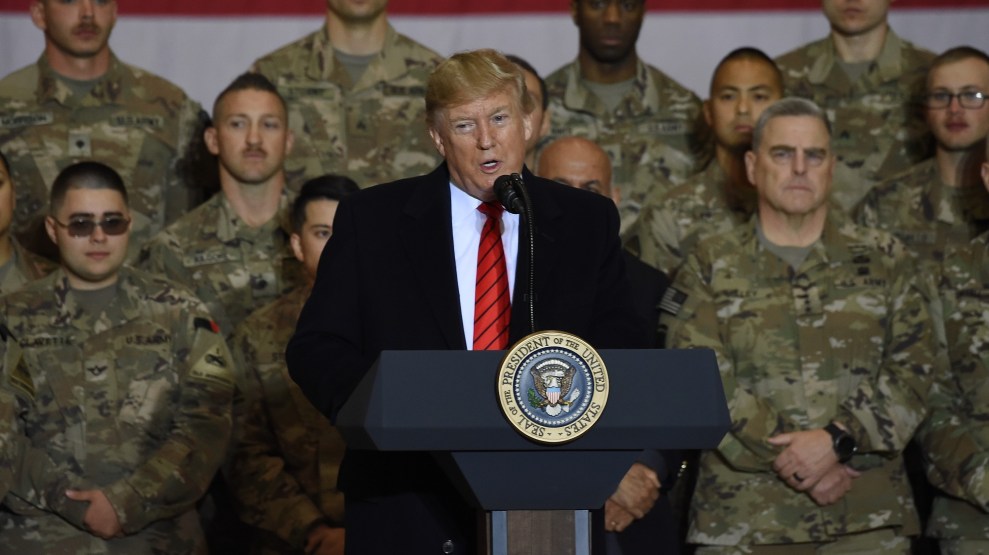
Mother Jones illustration; ZUMA
Joe Biden is facing a looming deadline that could define the early foreign policy outlook for his presidency. In less than two months, he must decide what to do about the roughly 3,500 American troops still stationed in Afghanistan.
Before leaving office, Donald Trump’s negotiating team, led by Ambassador Zalmay Khalilzad, reached an agreement with the Taliban to complete a full withdrawal of US forces by May 1. That deadline leaves Biden with a difficult choice and not much time to make it. He can adhere to the deal, negotiate an extension, or abandon the Trump administration’s framework altogether and start from scratch—prolonging the now two-decade long war that a majority of Americans want to end, according to a poll conducted across December and January by YouGov and the pro-withdrawal group Concerned Veterans for America.
For Will Ruger, a Charles Koch Institute official who has become one of the more prominent advocates in Washington for a total withdrawal, there isn’t much of a choice. “President Biden has to choose between Mr. Trump’s withdrawal and Mr. Biden’s war,” Ruger wrote in a New York Times op-ed late last month. “The right choice is obvious.”
Within Biden’s Cabinet, the decision is not so clear-cut and many observers expect him to keep at least some US troops in the country. One potential solution, floated in a pair of Biden administration documents that leaked recently, is the creation of a temporary government with power shared between the Taliban and US-backed Afghan leaders. Such a deal would unmoor Biden from the timeline adopted by Trump and leave open the possibility of some troops remaining in Afghanistan for a longer period of time.
Ruger, known for his longtime affiliation with the Charles Koch Institute and the Koch-backed Stand Together movement, is no one’s idea of a Green Party activist or an antiwar critic. The closest he has ever come to serving in a high-level government role came when Trump tapped him to be ambassador to Afghanistan last year. The nomination expired following the 2020 election, but it boosted his profile at a time when progressive Democrats and restraint-minded Republicans were already becoming more successful at bucking the traditional, interventionist view of foreign policy that has long been ascendant in Washington, DC.
With Ruger’s urging and due to a coalition of antiwar groups allied with Stand Together, Congress passed a historic set of war powers resolutions aimed at curbing the president’s ability to declare war on Iran or have the military assist with Saudi Arabia’s war in Yemen. Trump vetoed both pieces of legislation, but their level of support signified a coming sea change in the foreign policy conversation.
Biden’s decision on Afghanistan is now the latest test case for how far the antiwar movement will be able to push its agenda. It is a moment Ruger and his allies do not plan to squander. “The Biden administration has been handed a gift by the Trump administration because on the politics side, President Biden can essentially say, ‘I’m sticking to this deal,'” Ruger told me. “And then the inevitable messiness that obviously will occur in any war termination scenario, he can blame on President Trump, on Ambassador Khalilzad. Hell, he can blame me. But I think we’ll all sleep well at night knowing Americans will no longer be killed in battle in Afghanistan.”
In the Washington foreign policy circles where Ruger has made himself most known, his views are no secret.
Despite being a Navy reservist who deployed to Afghanistan from 2008 to 2009, Ruger approaches foreign policy with the analytical lens of a political science professor—which he was for eight years at Texas State University. After joining the Koch network in 2014 and beginning to coordinate its foreign policy portfolio, he became a near-omnipresent force among the Washington antiwar caucus through constant op-eds, panel discussions, and off-the-record dinners with journalists and experts.
With his wire-rim glasses and professorial disposition, he would fit easily inside the Blob—Washington-speak for the professional foreign policy thinkers who believe in an expansive US role in the world—save for one problem: he shares none of its views. “We have not had a healthy marketplace of ideas in the foreign policy space,” Ruger told Politico last year. “There should be no opprobrium given to people’s desire to find a diplomatic arrangement to avoid or end conflict.”
Even though Ruger’s institutional affiliation often aligns him with libertarian-minded conservatives, his staunchest allies on foreign policy often come from across the aisle. At a panel discussion last year, he praised progressive Rep. Ro Khanna (D-Calif.), who co-chaired Bernie Sanders’ presidential campaign, for being one of the “political leaders across the spectrum stepping up” for the Americans who loathe the waste of “blood and treasure” abroad. During the discussion, Khanna and Ruger took turns dismissing an argument by David Petraeus, the retired general who led US forces in Iraq and Afghanistan, that the US commitment to remain in Afghanistan was a necessary way to fight terrorism. “I just see the world very differently and I’m guessing you do too,” Ruger told Khanna.
There is no better evidence of the strange alliances that sprout up around foreign policy than the one George Soros and Charles Koch formed in 2019. The wealthy donors share little in common except for the mutual enmity of their respective followers, but that year, they joined together to fund the Quincy Institute for Responsible Statecraft, a think tank that employs non-interventionist scholars from across the political spectrum. Quincy’s online magazine, Responsible Statecraft, regularly publishes contributions from progressive groups like Win Without War and the nonpartisan watchdog Project on Government Oversight. Ruger has no formal affiliation with Quincy, but he spoke at one of their conferences and has co-written pieces with Quincy fellow Rajan Menon.
“The value of these alliances has been clear: they translate into bipartisan votes in Congress,” Erica Fein, advocacy director at Win Without War, told me. “We may not agree on what world we want to ultimately see, but we work together with clear eyes about where our values don’t align.”
Quincy is a visible outgrowth of the antiwar movement’s growing influence, but also a symbol of something the movement has long lacked: money. Since the end of 2019, Concerned Veterans for America, the Koch-backed pro-withdrawal group, has spent more than $4 million on TV and digital ads supporting a full withdrawal of troops from Afghanistan, CVA senior adviser Dan Caldwell told me. During the presidential campaign, the ads ran in swing states like Michigan, Pennsylvania, and Wisconsin, alongside spots in Washington, DC. Last month, the group launched its fourth ad campaign dedicated to Afghanistan.
A majority of Americans support Trump’s deal to extricate the United States from Afghanistan by May 1, including nearly 60 percent of Biden supporters, according to a Eurasia Group poll commissioned in September. Ruger thinks that sentiment applies to the ruling class too, even as presidents from both parties have continued to keep a US military presence in Afghanistan as a bulwark against the Taliban resuming control. “There is a sense pretty broadly in Washington that these endless wars seem to be dragging on, there doesn’t seem to be a lot of value in staying, and that maybe we might want to turn a corner so we can focus on the rise of China and these domestic priorities,” Ruger said.
During the Trump era, CVA frequently partnered with left-leaning groups to push in favor of withdrawal and, more recently, the Koch network has dumped money into think tanks across Washington. The libertarian Cato Institute, co-founded by Charles Koch in the 1970s, is a major recipient—according to data compiled by Anna Massoglia, an investigative researcher at the Center for Responsive Politics—but so are other organizations across the ideological spectrum, including the nonpartisan Atlantic Council and International Crisis Group, whose chief executive Biden appointed in January to be special envoy to Iran.
That $4.5 million Atlantic Council grant, “aimed at generating creative, out-of-the-box foreign policy thinking,” came under scrutiny recently after several Atlantic Council staffers signed a letter publicly disputing an article about Russia by Emma Ashford and Mathew Burrows, two Atlantic Council experts affiliated with the Koch-funded program. One signatory complained anonymously to Politico that the Koch money “operates as a Trojan horse operation trying to destroy good institutions,” a claim Atlantic Council CEO Fred Kempe dismissed as “an outrageous charge.”
Other Koch donations went toward a debate series at the Brookings Institution, the professional home for some of Biden’s most senior State Department appointees, including Victoria Nuland and Bonnie Jenkins, and in January, to the International Crisis Group. At the time, ICG was led by Malley, whose nomination to be Biden’s special envoy to Iran was harshly criticized by Sen. Tom Cotton (R-Ark.) and other Iran hawks. A press release announcing the grants included quotes from Ruger and Malley, who said the gift would strengthen his group’s advocacy for “a foreign policy that better prioritizes diplomatic over military solutions to the challenges of the day.”
Advocates for a full withdrawal have the visibility and resources to mount a sustained campaign. What they lack is a like-minded ally in Biden’s inner circle and, more potently, a defense against the notion that a US withdrawal will be devastating for the progress made by Afghans over the past two decades, especially for women.
At a recent National Security Council meeting, Chairman of the Joint Chiefs of Staff Mark Milley said women’s rights “will go back to the Stone Age” if US forces leave by May 1, Vox‘s Alex Ward reported. (In a response that some attendees interpreted as a rebuke to Milley, Defense Secretary Lloyd Austin apparently said later in the meeting, “We’re not going to make decisions based on emotion.”)
The United States has dumped roughly $2 trillion into Afghanistan and lost more than 2,200 American soldiers fighting the Taliban. For all that effort, the war has only produced a “modicum of success,” as Milley memorably put it last year, while serving as a reminder of the US government’s habit of lying to its own citizens about its activities overseas. Even with broad frustration with how the United States has conducted the war, some US and Afghan officials fear that ending it could be worse. In a recent interview with the New Yorker, Afghan Vice-President Amrullah Saleh suggested that a faulty peace deal could renew a level of violence that Afghanistan has not seen in decades. “People will not accept the Taliban,” he said. “It will be another civil war”—worse than the one that “killed more than fifty thousand people” in the 1990s.
The Afghanistan Study Group, a group of former military leaders, lawmakers, and experts commissioned by Congress to study the impact of a peace agreement with the Taliban, similarly concluded in a report last month that a withdrawal in May “will likely lead to a collapse of the Afghan state and a possible renewed civil war.” The group recommended a conditional withdrawal that could keep the United States mired in Central Asia indefinitely.
Gen. Joe Dunford, the former chairman of the Joint Chiefs and one of the report’s co-chairs, even said the existing amount of troops might not be enough to ward off the Taliban. “In the fall, what we were told by commanders on the ground in the Department of Defense was that 4,500 US forces, in addition to the NATO forces that are there, was the minimum level to address both the mission as well as protection of our forces,” he told Congress last month. “So in our judgment, 2,500 would not be adequate, should the Taliban re-initiate attacks against the United States.” (Though the Pentagon has publicly said there are 2,500 US troops in Afghanistan, the New York Times reported earlier this week “that number is actually around 3,500.”)
If Biden reneges on the previous administration’s deal, the Taliban will almost certainly end its year-long prohibition on attacking US soldiers. “You can’t have a peaceful Afghanistan while having a permanent US presence because the presence of US troops is partly what drives the Taliban to fight in the first place,” Adam Weinstein, a Quincy Institute research fellow and Marine Corps veteran, told me.
With the clock ticking toward Biden’s deadline, Ruger and his allies have worked to pressure Biden to end the US military presence in Afghanistan. Since Facebook began permitting political ads again on March 4, CVA has spent more than $91,000 on ads promoting a full withdrawal—putting it in the top-10 of political ad buyers over that span—and poured money into billboards.
Pleased to see @ConcernedVets is continuing to push hard to end our endless wars. Here is the billboard ad on #Afghanistan we are taking out in multiple places around the country. Please take the time to send a text in support of our troops & our national interests! pic.twitter.com/Tnn8zn7KSl
— William Ruger (@WillRuger) March 15, 2021
A key argument Ruger has pushed through op-eds and other appearances recently is that Biden will bear responsibility for the results of a broken deal. If the US breaks its commitment, he and others argue it will only drive further backlash from the Taliban and come at an unfortunate time in the calendar—when the Taliban’s fighting is often most fierce.
“If we break the deal with the Taliban, then the Taliban is going to reengage with targeting US forces there. That’s going to lead to more American deaths,” Ruger told Business Insider in January. “If Biden breaks the deal with the Taliban and keeps forces in the country, then…he will own the results.”
Images from left: Cpl. Clay Beyersdorfer/Planet Pix/ZUMA; Photo courtesy of Will Ruger; Nelvin C. Cepeda/U-T San Diego/Zuma
















